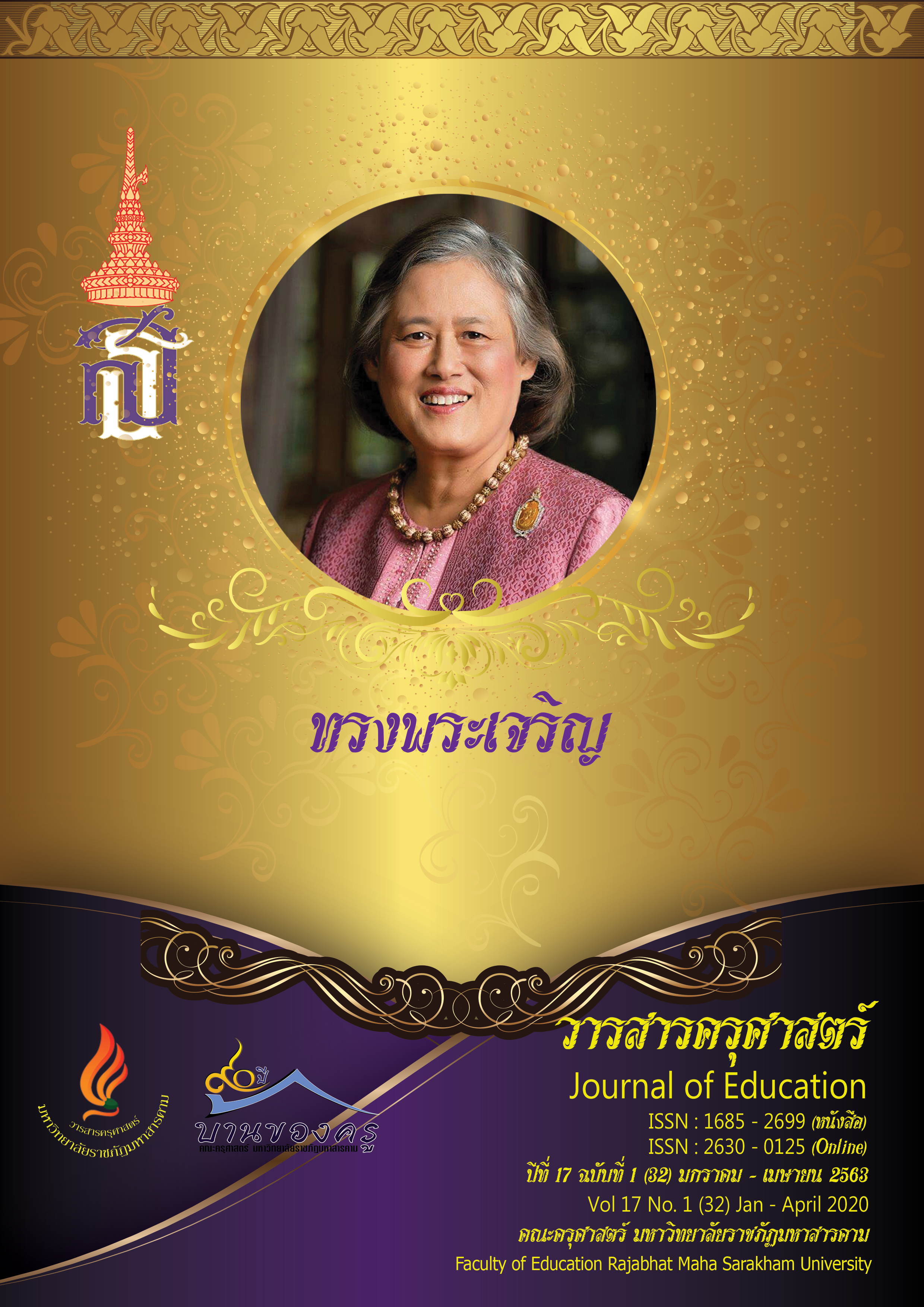A Cognitions and Living Behavior Derived from Economic Sufficiency Philosophy of Teachers under the Office of Non-Formal and Informal Education, KhonKaen Province
Main Article Content
Abstract
The purposes of this research were: 1. To study the level of cognitions’ of Economy
Sufficiency Philosophy; 2. to study the level of living behavior cognitions of the Economy
Sufficiency Philosophy; 3. to compare the level of living behavior; 4. to study the relationship
between the level of cognitions and living behaviors of Economy Sufficiency Philosophy of teachers
under the Office of Non-Formal and Informal Education, KhonKaen Province. The sample consisted
of 257 teachers under the Office of Non-formal Education and Informal Education by multi-stage
sampling. The research instruments were 20 items of paper test and 30 items of questionnaires.
The research revealed that 1) The level of cognitions’ Economic Sufficiency Philosophy of
the most teachers at moderate level, 2) the level of living behavior of the Economic Sufficiency
Philosophy of teachers was generally at a high level, 3) comparison with living behavior level found
that teachers with different gender, status and work experience have the same living behavior in
overall and individual aspects but there have a non-difference in living behavior statistical of the
difference is at the level of 0.5, and 4) The relationship between cognition and living behavior found
that there was a relationship at 0.1 level of significance.
Article Details
ข้อกำหนดเบื้องต้นที่ผู้นิพนธ์(ผู้ส่งบทความ) ควรทราบ
1. ผู้นิพนธ์ที่ประสงค์จะลงตีพิมพ์บทความกับวารสาร ตั้งแต่เดือนมกราคม 2563 เป็นต้นไป ให้ใช้รูปแบบใหม่ (Template 2563) โดยสามารถดูตัวอย่างได้ที่เมนู GUIDELINES
2. จะตีพิมพ์และเผยแพร่ได้ ต้องผ่านการประเมินจากผู้ทรงคุณวุฒิ (Peer Review)
3. การประเมินบทความโดยผู้ทรงคุณวุฒิ (Peer Review) เป็นแบบ Double Blind
4. การอ้างอิงบทความใช้หลักเกณฑ์ APA (American Psychological Association) คลิก
5. บทความถูกปฏิเสธการตีพิมพ์ ไม่ผ่านการประเมิน ผู้นิพนธ์ขอยกเลิกเองหรือชำระเงินก่อนได้รับการอนุมัติ ทางวารสารไม่มีนโยบายการคืนเงิน
References
ทีมข่าวเศรษฐกิจ. (2559, 19 ธันวาคม). น้อมนำ “เศรษฐกิจพอเพียง” สู่แผนพัฒนาชาติแบบยั่งยืน. ไทยรัฐ.สืบค้นจาก https://www.thairath.co.th/content/814647
นิภาพร นันตา. (2555). ความรู้ความเข้าใจและพฤติกรรมในการดำเนินชีวิตตามหลักเศรษฐกิจพอเพียงกับปัญหาด้านสิ่งแวดล้อมของชุมชนบ้านไร่กองขิงและบ้านต้นเกว๋น อำเภอหางดง จังหวัดเชียงใหม่ (วิทยานิพนธ์ปริญญาศิลปศาสตรมหาบัณฑิต). มหาวิทยาลัยเชียงใหม่, เชียงใหม่.
บุญชม ศรีสะอาด. (2545). การวิจัยเบื้องต้น (พิมพ์ครั้งที่ 7). กรุงทพมหานคร: สุรีวิยาสาส์น.
ไพศาล วรคำ. (2559). การวิจัยทางการศึกษา (พิมพ์ครั้งที่ 8). มหาสารคาม: มหาสารคามการพิมพ์.
วีรวิชญ์ ตันวรรษรักษ์. (2556). การดำเนินชีวิตตามแนวปรัชญาเศรษฐกิจพอเพียงกับพฤติกรรมการออมของพนักงานโรงงานอุตสาหกรรมในนิคมอุตสาหกรรมไฮเทค จังหวัดพระนครศรีอยุธยา (วิทยานิพนธ์ปริญญาบริหารธุรกิจมหาบัณฑิต). มหาวิทยาลัยราชภัฏพระนครศรีอยุธยา, พระนครศรีอยุธยา.
สำนักงานคณะกรรมการพิเศษเพื่อการปะสานงานโครงการอันเนื่องมาจากพระราชดำริ. (2556). 4,350 การทรงงานเพื่อประโยชน์สุขแห่งมหาชน. กรุงเทพมหานคร: สำนักงานคณะกรรมการพิเศษเพื่อการประสานงานโครงการอันเนื่องมาจากพระราชดำริ.
สำนักงานส่งเสริมการศึกษานอกระบบและการศึกษาตามอัธยาศัย. (2559). ร่วมเรียนรู้ปรัชญาของเศรษฐกิจพอเพียงและเกษตรทฤษฎีใหม่เพื่อการพัฒนาที่ยั่งยืน. กรุงเทพมหานคร: รังษีการพิมพ์.
เสาวนารถ เล็กเลอสินธุ์. (2560). ความรู้ความเข้าใจและการประยุกต์ใช้หลักปรัชญาเศรษฐกิจพอเพียงในการพัฒนาเศรษฐกิจชุมชน ตำบลบางใหญ่ อำเภอบางใหญ่ จังหวัดนนทบุรี. วารสารวิชาการมหาวิทยาลัยธนบุรี,11(25), 88-98.
อรวรรณ ชมชัยยา และขวัญใจ จริยาทัศน์กร. (2555). ความสัมพันธ์ระหว่างพฤติกรรมการดำเนินชีวิตของผู้ปกครองตามหลักเศรษฐกิจพอเพียงกับคุณลักษณะดี เก่ง มีความสุข ของเด็กปฐมวัย ในศูนย์พัฒนาเด็กเล็ก จังหวัดนนทบุรี (รายงานการวิจัย). กรุงเทพมหานคร: มหาวิทยาลัยราชภัฏสวนดุสิต.


